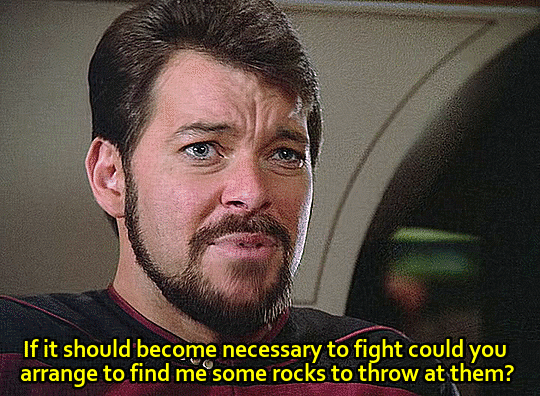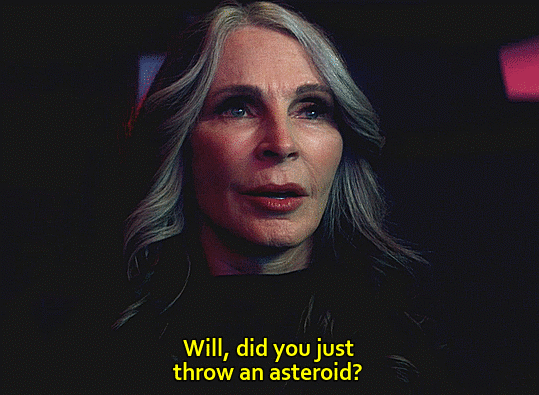#Constitution-III class
Text
I have so many critiques of the writing in Star Trek: Picard's third season that I don't think that I've actually expressed how incredibly ugly (and just what a stupid concept) I find the Constitution-III class to be

And it's just such a complete vandalization of the original Luna-class Titan (of which it is, allegedly, a refit), which was a fan design, and was actually quite beautiful:

And my god, the ship doesn't even get to keep its *name*. It gets retitled the Enterprise-G because M'talas seems honestly to believe that the highest honour possible is to be pulped down and remoulded as a copy of something that he grew up with.
#star trek picard#picard salt#uss titan-a#starships#Constitution-III class#luna class#uss titan#uss Enterprise-G
26 notes
·
View notes
Text


Marc Bell released his CG model of the new Titan-A/Enterprise-G a few days ago, and I decided it was high time I got back into the groove and made some pretty spaceship pictures. Process details on my blog.
#star trek#lightwave#cgi#enterprise-g#constitution-iii class#defiant-class#jem hadar fighter#star trek picard
2 notes
·
View notes
Text




Star Trek The Next Generation "Contagion" & Star Trek Picard "No Win Scenario" requested by @frontier001
#Star Trek Picard#PIC#No Win Scenario#spoilers#TNG#Contagion#Star Trek The Next Generation#William T. Riker#Beverly Crusher#USS Titan#Titan A#Shrike#Neo Constitution Class#Constitution Class III#startrekedit#tngedit#picardedit#GIF#my gifs#Danny and Renae watch PIC
2K notes
·
View notes
Text





Connie III by White Rooster Productions
#Star Trek#Federation#Starfleet#Constitution III Class#Sci-Fi#Mecha#Spaceship#White Rooster Productions
74 notes
·
View notes
Text

Our Place in the Stars by White Rooster Productions
#Star Trek#Federation#Starfleet#Constitution III Class#Neo Constitution Class#USS Enterprise-G#NCC-1701-G#White Rooster Productions#Sci-Fi#Mecha#Spaceship
70 notes
·
View notes
Text
Spaceshiptember 2023, Day 30: Creative Freedom 2 - "To the Future"

The latest in the Enterprise dynasty, boldly going where no one has gone before!
#fanart#3d render#star trek#blender#blender render#spaceship#starship#3d art#artwork#spaceshiptember#uss enterprise#enterprise#ncc-1701-g#star trek fanart#star trek picard#star trek picard fanart#star trek legacy#neo constitution class#constitution iii class
34 notes
·
View notes
Text

Star Trek III: The Search for Spock - USS Enterprise in Spacedock Concept Art by Nilo Rodis Jamero
#Star Trek#Star Trek III: The Search for Spock#Concept Art#Federation#Starfleet#Constitution Class Refit#Refit!Constitution Class#Sci-Fi#Mecha#Spaceship#Space Station#Nilo Rodis Jamero
6 notes
·
View notes
Text

Heir to the Throne - by Jetfreak-7
As the torch is once again passed to a new generation of explorers, this sparks the debut of the next starship Enterprise. Rising to the occasion, the NCC-1701-G carries the legacy of the illustrious name into the 25th Century.
#star trek#uss enterprise#enterprise g#ncc-1701-g#constitution iii class#neo constitution class#25th century#starfleet#united federation of planets#starship#scifi#science fiction#jetfreak-7
3 notes
·
View notes
Text

source from Dave Blass and Doug Drexler
Neo-Constitution Class III - USS Titan-A/Enterprise G.
For my own references.
#star trek picard#25th century starfleet#uss titan a#enterprise g#ent g#neo constitution class#constitution iii class
3 notes
·
View notes
Text
The Failure of Ted Lasso's Unconventional Politics
SOCIAL CONDITIONING:
According to Brendan Hunt, shippers interested in a second chance, mature-age romance between Ted and Rebecca were being blindly, un-self-reflexively led about by their “social conditioning”. Presumably, however, the writers who wrote Ted returning to his heteronormative family unit – as well as all the viewers who enjoyed this ending and have defended it since – are completely free of social conditioning? No social conditioning is involved in reifying the white heterosexual family unit? No social conditioning is involved in deifying parenthood, fatherhood and patriarchy at the cost of all else? There is no social conditioning involved in a conclusion that values good ole working class Americana while rejecting the big, queer, complicated, multicultural world?
KISS (Keep It Simple Stupid):
If the creators wanted to gesture to “Cheers” as a classic American sitcom, then at least learn from its example. This show worked best when it worked with familiar, beloved characters in a familiar, beloved, but confined setting. "Ted Lasso" had a near-perfect first act, doing a simple thing well. But from s2 onward, the show started straying out of bounds. The cast of characters kept expanding and contracting: people were in, people were out, characters were coming and going and changing (what was the point of that whole Zava plotline?). We had multiple workplaces and workplace dramas (grew to like Barbara tho). Episodes got long and unwieldy. Themes got convoluted as the show took a long trip, imo, up its own arse. The folksy wisdom of s1 became grating self-indulgence and cliched “moment” manufacturing.
SUPERFICIAL UNCONVENTIONALITY:
TL employed a familiar 3-part structure but ultimately its supposedly radical, unconventional politics was not reflected in the show’s structure. Since the first act started with Ted's arrival, you could see his departure coming from a mile off. Some folks are acting like returning Ted home constitutes some super brave move by the writers that we've never seen before. But if you want to talk social conditioning expressed through narrative expectation then you really couldn't get anything more conventional than this ending.
We've seen it all before:
Act I: Fish-out-of-Water character arrives and begins winning over a dubious, dysfunctional community
Act II: Bonding, hijinks, missteps, complications and development
Act III: Revelations of growth. Community sadly waves goodbye to teacher they love but no longer need. Cue credits with moving song choice.
It's as cliche, conventional and predictable as it gets. And I could condescendingly accuse every viewer who enjoyed this ending as being blindly and un-self-reflexively led around by their social conditioning. But even if I'm not one of the showrunners who also played a beloved character and who is speaking on a public forum, that would be a pretty fucking shitty move. What I am saying is that the disagreement over this ending speaks to some core ideological differences currently playing out across the globe around patriarchy, feminism, queerness and privilege. There is an opportunity here to examine what we socioculturally view as “good’ and “right” and “happy”. These ideas of good, right and happy are not necessarily benign and will be inevitably reflected in and reproduced by our art.
PATRIARCHY:
In the end, “Ted Lasso” literally chose patriarchy (but what kind is the question). Just because this show was working with a familiar 3-part structure, that doesn't mean it didn't need to justify Ted's inevitable departure. For many people, his son is enough. That's it. End of conversation. Henry trumps all. And yes, this was always going to be the justification used by the series. But I think this disagreement highlights changing attitudes to modern parenting. Everyone agrees that parenting requires sacrifice: large and small, everyday and lifelong. But how much sacrifice is too much?
For some people, this was too much sacrifice. Others seem to think it was Ted's duty to sacrifice for his son his own sense of family and community, his continued health and growth, his professional fulfilment. Imo, he could have shared all of this with him but chose old-school parental sacrifice instead. I consider this kind of sacrifice to be something that culturally we’re coming to recognise as unhealthy, for both parent and child. In reality, parents are more than one thing. Parents have jobs, interests, relationships, needs, limitations and struggles. Parents are people.
In the series, Ted was established as a person: a person with a sad past, a tortured inner world, a strong desire to connect with others and, potentially, a brighter future than his past. From the beginning, his relationship with Michelle was established (and often reinforced) as over, dead, absolutely no route back in. But his relationship with his son was loving and important to him. Of course it was. He’d be a bad man and unlikeable character if it wasn’t. Even so, Henry isn’t a major or fully realised character in this show. We care about him, relate to him through Ted. He matters to us because he matters to Ted. But frankly, we are far more attached to Ted’s other adopted “children”, the relationships we have watched him develop over 3 years, than the relationship we only saw glimpses of. That’s just narrative reality. In reality, yes, Henry would and should be Ted’s first priority. This is only right. In fiction, the team at Richmond should have been the first priority of Jason and the rest of the writing team. They are the ones we want to see and want to see happy and settled.
As many frustrated viewers have stated, it's not Ted's departure that is so disheartening but how it was done. If the TL team wanted to make this choice seem like a healthy one for Ted then they needed to establish other things waiting for him in Kansas: friends, community, employment, fulfillment. As it was, literally nothing tipped the scales in favour of Kansas. There were no romantic, community or larger familial relationships to get back to. Far too much was just left to inference or imagination. Yes, we can assume that Ted has community in Kansas, that he will probably get a great job after his success in Richmond. But all the people and opportunities we would like to infer/imagine will never tip the balance towards Kansas when we consider all we KNOW is already established for him in Richmond. The homeworld and beloved characters of a show will always hold more emotional weight than anything undefined and hypothetical. If viewers were to be happy with Ted’s exit then the writers needed to take the time to lovingly define his future away from the club.
Instead, it seems like a deliberate choice to shut Ted down and perform (and I do mean “perform”) this marvelous sacrifice for his son that so many think is admirable. It’s this shutdown that is so inconsistent and confusing. Because at any time in the hour, Ted could have said to Rebecca, the Diamond Dogs and/or his team:
“Look y'all this ain't the end. We’re family now. I'll be back. I'll show y'all round Kansas anytime you wanna visit. My mom will cook a dinner that will clog your arteries. And every so often, what say we do a long-distance movie night, huh? I'll miss you all but I’ll be watching every game and I can't wait to come back and see you win the whole fucking thing!!”
Ted could have been a model of honest, expressive, emotionally forthcoming, relationship-maintaining masculinity. But nope. Not a word. Just brave male sacrifice. It's straight up patriarchal propaganda. And truth is, fathers sacrifice way less than mothers do in heterosexual parenting relationships. Mothers are generally the ones making those small, everyday sacrifices that our society rarely acknowledges or admires. But I bet this ending makes all those lazy husbands and boyfriends feel real good about themselves. I bet it makes many female partners feel all warm and fuzzy to know that even though their kids’ father won't share half the labour that goes into raising a child, when it comes time for him to perform a massive manly sacrifice for his family, he toootttaaally will. I'm sorry, what were you saying about social conditioning Mr. Hunt?
FATHER GOD or WHITE SAVIOUR?:
Patriarchy needs its Father Gods and its Mother Gods to play certain roles (tho, to paraphrase Angela Carter, both are as silly as each other.) These magical figures materialise at pivotal times then dematerialise when the narrative is over, the pivotal lessons learned. They never themselves learn or alter. Think Mary Poppins or Nanny McPhee. These figures are not entirely human, they possess an element of the supernatural. They serve others, serve a higher purpose. Nanny McPhee's appearance changes only as a reflection of her charges’ growth. Mary Poppins – the figure to whom Ted is most likened – learns to care about her kids but she doesn't engage in any self-introspection. Her duty and trajectory remains unchanged. When she arrives at her next job, she will do so exactly the same as she was.
These otherworldly mother deities are not unproblematic feminist figures themselves. But creating a male, fatherhood deity becomes even more problematic when he is white, cis-het and pretty able. Ted arrives to teach all the black and brown lost boys, to unite the disconnected women, liberate the closeted gays and to update the bumbling English gentlemen (there is, I feel, a special relish in these American bros educating their former colonisers on modern manhood). Here, we start to stray into white saviour territory. Frighteningly, this kind of patriarchal demi-god implies that white men are the most progressive figures in a society, they are in the political vanguard, championing the needs of the disconnected and downtrodden. White men are the ultimate source of wisdom, kindness and progress. It represents them as a group as progressive, when in reality the attitudes and politics of this group represent conservative politics and regressive values that impede the progress of every other marginalised group. If we buy this myth about white men, then we are more likely to accept what they say to us from their positions of power and privilege as right, wise, kind and progressive, even when it is the opposite.
So, if you are going to put forward a white man as a model of progressive politics, then you need to embrace unconventionality, not just superficially but down to your bones. “Ted Lasso” tried to structure s2 and s3 differently but just ended up making a mess of allusions and ideologies that did not connect, cohere, develop or conclude. In fact, sometimes they straight-up contradicted. Employing a magical 3-part structure and making a bunch of meaningless allusions to well-known classics does not another classic make. They did not engage with any of these classics (“Cheers”, “Mary Poppins”, “The Wizard of Oz”) in any deep or critical way. Classics may be loved but they are not faultless. If you simply repeat what has already been done, even in celebrated classics, you may just end up repeating mistakes someone already made for you to learn from. TL repeats the central feminist problem of parental deities in “Mary Poppins”, just as it repeats the irreconcilable ending of “The Wizard of Oz”.
LIMINALITY:
Both “The Wizard of Oz” and “Mary Poppins” take us into strange liminal worlds. “Ted Lasso” could be read similarly, except that Ted doesn't take any magic home with him. In fact, he seems to actively forget it, reverting to the Ted he was before leaving. No queerness or feminism follows him home, no traces of the various cultures he's come into contact with. The liminal remain liminal with no indication that these two worlds will communicate or can integrate. The non-white, female, queer and otherwise bizarre are left outside of Ted’s squeaky clean hometown heteronormativity. And I really don’t think I have to explain why that is so deeply irresponsible. Because again, this is a writing choice.
That epilogue at the end was brief but imagine if it included more detail: Ted texting with Rebecca, or facetiming with Roy, Jamie giving Henry advice. They didn't take the time to honour and continue these relationships or integrate these two worlds. They didn't suggest that responsible fatherhood could entail many things, could look different. “Sacrifice,” they said profoundly. “Fatherhood,” they murmured mistily. “Patriarchy” was their final word to which this feminist says, “Bullshit.”
PRIVILEGE:
I only did one film unit at uni but it really doesn't take much to deconstruct the absurdly inconsistent ending of “The Wizard of Oz”. It was 1939, the end of the Great Depression and the start of another devastating world war. People needed to be convinced that their small ramshackle b/w lives surrounded by loved ones were stable, noble even. They already had everything they needed. They didn't need Oz. They didn't need bright futures, big adventures or exciting opportunities. Monochrome Kansas was all a good American should ever hope for. There was danger in difference, safety at home.
Well, here we are in late-stage capitalistic hell, having come through (???) a pandemic and it takes a special sort of privilege to say to an audience: you don't need money or opportunity or community, they won't make your life any better than before. Be happy with the muddy and mundane. Be happy with what you've got. Turn away from larger community, greater knowledge, continued stability, and isolate yourself in a bubble of you and yours. Look, it's not a sweet or familiar narrative conclusion but the truth is, Ted’s, Henry’s and Michelle’s lives would have all been better if they'd relocated to London. Do these dolts have any idea what teachers (in the USA esp) are currently going through? How overworked and underpaid and undervalued these people are? The burnout rates?? Ted didn't have to take the highest salary Rebecca offered but, had the writers been willing to put in the effort, a more unconventional, more modern ending to this series could have been crafted.
Not that I'm surprised they took the easy road to glory. All indications from the beginning of s3 suggested that this would be the rather predictable conclusion. Indications do not, however, constitute development. This team had the opportunity to write a new ending to an old story, one that incorporated queer, feminist and anti-capitalist values. One that defined a different, new version of patriarchy. They didn't even think to. In their white boi hubris, they just assumed that they and tradition knew best. Considering how many viewers would be struggling right now for food, housing, employment and opportunity, an ending in which Ted turns down an opportunity like this hits a false, rather virtue-signally note. Literally, nobody would have come out worse. Everybody would have benefitted from Ted staying in Richmond. Which means this decision was made purely to manufacture a “moment” that celebrates patriarchy.
ANTICAPITALISM: There’s a reason they had Rebecca offer Ted the biggest salary in his industry. They wanted to make it NotAboutTheMoney! Ted doesn’t say so (doesn’t say anything) but, because this narrative idea is so fucking familiar, we can assume the thoughts behind his oh-so-sage expression are: “Well, shucks now, boss, I rightly do appreciate the kindly offer but that there kid o’ mine is more important to me than any cash you could put in my silly lil handy-hands.” Good Lord. The cringe is real. I really, really can’t with this mighty, manly silence and sacrifice. My problem isn’t that Ted values his son over money (not that it has to be a choice because that money could benefit Henry and his mother, who is owed a heck of a lot of child support esp since she’s been raising their son solo for 3 years). Again, that is how it should be. My problem is that the show actively established Richmond as an anticapitalist landscape, then suddenly at the eleventh hour, tried to walk that back and imply it was actually a capitalistic landscape (in contrast to homey ole Kansas).
Capitalism teaches us to sniff at money. We've been told by the monied and privileged that it won't buy happiness. (This is of course, utter bullshit because money can buy you a hell of a lot of wellbeing, security and opportunity). At the beginning of the series, Rebecca Welton stands for this principle. And by the end, she has found a way to use her extreme wealth and privilege in an ethical way. She gives it away. She supports others. She lets Sam out of a promotional contract, she funds Keeley’s business, she sells half the club to fans. The most obvious example of Rebecca’s anticapitalist politics is her confrontation with all the richy riches who want to take soccer away from the people. Here, she becomes an anticapitalist leader, one who has been positively influenced by the anticapitalistic politics of The Lasso Way.
The Lasso Way is anticapitalistic in that it stresses that winning isn’t everything. You try but you try together. You play hard, not in order to beat the other guy, but to be the best (player, teammate, man) you can be. There are no individual stars, only collaborative team players. You give due credit to others, the team, the support staff. The club functions well when it functions as a unit. Over the course of the series, it becomes a commune that protects and nurtures its citizens. A socialist haven that values people over profits, prizes and meaningless acquisition. The Greyhounds don’t want to win the league for the money or the top spot. Winning the whole fucking thing is an expression of their regard for each other, the game and the new, kinder ethos they all now live by.
Because they spent 3 years establishing all of this (during a time when we really needed to hear it), there is something v disingenuous about them then having Rebecca offer to go to extremes to pay Ted more money than any man should have. It is not consistent with the show’s themes, the ethos of the club, Rebecca’s attitude or what she knows of Ted. She knows it’s not about the money for Ted. It never was. It’s an act of desperation on her part, but why did they need to make her ridiculous, desperate, so inept in this moment? Hannah plays it beautifully but I can’t help but feel this is part of them diminishing Richmond, (re)casting it as excessively capitalistic in relation to Kansas so that they can turn Ted’s decision into a simple Money < Son choice. Because if it is a Money < Son choice then he has no dilemma. There is no other choice. He goes home to his son. The problem is, they’ve just spent 3 years proving that it is not a simple Money < Son dilemma. Money was never actually part of this equation. Ted left to give Michelle space, to find himself, to find a new life and community, to extend himself beyond what he knew as normal. As such, there is now far more than just money for Ted in Richmond (which tbf, Rebecca also points out, but I still think this point stands).
The other major problem is that, here in the real world, middle-class America (which btw does not exist) is far from being a haven of peace and prosperity comparable to nowhere in the world. This is a lazy cliché than any amount of travel should quickly disabuse you of. And yet in Kansas, we are supposed to believe, despite everything happening in America (referenced by Henry in ep 3.01), Ted will find community, opportunity and stability. To pull off this ending, they needed to establish a Kansas unlike the one currently in existence. This is what they did with Richmond. The UK is no better than the US currently, but they nevertheless established an ideal society, one with values very contrary to the world we now live in. Is it any wonder that people saw the desertion of this world as a rejection of feminist, queer and anticapitalist values? Right now, more than ever, people want to believe in a society that isn't all about triumph, success, competition, acquisition, individualism and aggression. They want to believe in a society that emphasises community, values people, shares wealth, offers opportunity, encourages difference, improves lives and moves onward, forward, in circumspect but ethical steps. These themes were all there in the series. They just weren't utilised when it came time to shape its conclusion.
#ted lasso#ted lasso finale#ted x rebecca#jason sudeikis#brendan hunt#istg i'm done#i'm a ridiculous person#long post#did anyone read this?#fuck i overthink#dumb show#rebecca welton#rebecca welton deserved better#feminist queer anticapitalist rant#i'm here to tell you that if you like ted lasso you're probly a socialist
132 notes
·
View notes
Text
“Joly will go to Dupuytren’s clinical lecture, and feel the pulse of the medical school.”
Puns are serious in politics.
More seriously, this chapter is nice in how it shows Enjolras’ love for his friends. He knows them really well, as demonstrated by their assignments. Courfeyrac, for instance, gets to utilize his social skills and general friendliness with the students who have the day off, whereas Joly gets to talk to fellow medical students and Bossuet gets to handle the law students. Picpus seems to have been a working class neighborhood with many craftsmen, suiting Combeferre’s curious nature. La Glacière was where ice was collected in winter to store for summer, so we can assume this was also a working class area suited to Feuilly, just as the Romantic Prouvaire is suited to a masonic lodge.
I tried to find information on the Cougourde, but the text for this chapter came up instead.
While it’s nice to see Enjolras’ knowledge of his friends from an emotional perspective, it also illustrates that he’s a good leader, utilizing each of their strengths to further their cause. He even remembers (and accurately describes) Marius, who doesn’t even show up anymore!
Grantaire may scold Enjolras as an “ingrate” here, but he did call republican ideas “twaddle,” so Enjolras is justified in being skeptical of him. The allusions in what Grantaire says are mainly to writings from the time of the French Revolution or that were very influential in it (like Rousseau’s Social Contract). The Hébertists were a radical group during the Revolution. He errs in saying the “constitution of the year Two” (there were constitutions for years I and III, but not II), but I believe he paraphrases the Declaration of the Rights of Man? So Grantaire does know what he’s talking about; he just isn’t making much of a point. As we’ve seen with his other speeches, he’s clearly well-educated from the breadth of what he alludes to, but he’s not really motivated politically.
The Robespierre waistcoat is such a dramatic touch.
And not to say too much about Enjolras loving his friends, but this!!:
“He composed, in his own mind, with Combeferre’s philosophical and penetrating eloquence, Feuilly’s cosmopolitan enthusiasm, Courfeyrac’s dash, Bahorel’s smile, Jean Prouvaire’s melancholy, Joly’s science, Bossuet’s sarcasms, a sort of electric spark which took fire nearly everywhere at once.”
He cares so much!
90 notes
·
View notes
Text

Plague Spewer
Huge undead, neutral evil
Armor Class 15 (natural armor)
Hit Points 189 (18d12 + 72)
Speed 40 ft.
Saving Throws Con +8, Wis +5
Damage Immunities poison
Damage Resistances necrotic
Condition Immunities poisoned, paralyzed, exhaustion
Senses darkvision 60 ft. passive Perception 11
Languages understands the languages it knew in life but can’t speak
Challenge 10 (5900 XP)
Undead Fortitude. If damage reduces the plague spewer to 0 hit points, it must make a Constitution saving throw with a DC of 5 + the damage taken, unless the damage is radiant or from a critical hit. On a success, the plague spewer drops to 1 hit point instead.
Actions
Multiattack. The plague spewer uses Vomit Rat Swarm if it is able to. It then makes two slam attacks.
Slam. Melee Weapon Attack: +11 to hit, reach 5 ft., one target. Hit: 16 (2d8+7) bludgeoning damage plus 13 (3d8) necrotic damage. If the target is a creature, it must succeed on a DC 15 Constitution saving throw against disease or become poisoned until the disease is cured. Every 24 hours that elapse, the target must repeat the saving throw, reducing its hit point maximum by 5 (1d10) on a failure. The disease is cured on a success. The target dies if the disease reduces its hit point maximum to 0. This reduction to the target’s hit point maximum lasts until the disease is cured.
Vomit Rat Swarm (4/Day). The plague spewer vomits a swarm of rats, which appears in an unoccupied space within 10 feet of it. The rat swarm acts on its own initiative count. On their turn, each rat swarm attacks the creature nearest to it other than the plague spewer.
The origin of these horrifying creatures is unknown. Perhaps created by an ancient necromancer or plague god in some forgotten age past. They lurk in catacombs or about the countryside, spreading rot and disease wherever they go. Plague spewers stand around 22 feet tall and weigh 10 tons.
Originally from the Monster Manual III.
85 notes
·
View notes
Note
Hello, recently you answered an ask about how Hamilton reacted to the Hamilton-Madison fallout, and one of the things you said was "These men were very crucial figures in American law, which shows that, unlike men like Jefferson, he [Hamilton] was very selective in who he chose to associate with when it came to his work."
Was Jefferson particularly indiscriminate when it came to finding collaborators, or was Hamilton particularly selective (or a little bit of both)? Could you provide some examples for this contrast?
hello first of all, the structure of your ask had me literally salivating screaming crying on the floor because this is such a wonderfully structured ask and it is the perfect formula to get an in depth response bc there’s so much i could talk about here. i love you. anyway-
Let's break this down to each dude. First, the worst dude, Thomas "freak" Jefferson. Jefferson's political career began when he joined the House of Burgesses, which, as the name implies, is a house of Burges (its a legislature). His first major publication was A Summary View of the Rights of British America, a Revolutionary work of literature that called King George III a cunt in formal language, was done entirely by himself, and it was rejected by his contemporaries for being too radical. This gained him a reputation for being a blue haired liberal.
Source: The American Heritage Book of the Presidents and Famous Americans (book 2)
Jefferson would go on to write The Causes and Necessity of Taking up Arms with John Dickinson in July, 1775 to, yk, explain the causes and necessity of taking up arms against the British. John Dickinson was a very well known politician, being a member of the Continental Congress and one of the elite group of Americans who had the chance to be educated in England. Both Jefferson and Dickinson were known revolutionary voices, despite the differences of opinion that would arise between them in the following debate on independence. They were also both members of the Second Continental Congress.
Source: American Battlefield Trust, Delaware Historical and Cultural Affairs
The question of why Jefferson worked with Dickinson is most relevant to this ask. And the answer, in my opinion, is just because it was convenient. The Continental Congress was the best- "best"- men of each state coming together to represent their respective homelands. Dickinson and Jefferson most likely had conversations about the subject they would go on to write about, and decided to write it down and publish it for public benefit. We'll come back to this later.
Okay, now the elephant in the room: the Declaration of Independence. I find this subject so boring so bear with me. Jefferson was chosen by the Declaration committee (consisting of John Adams, Benjamin Franklin, Thomas Jefferson, Robert Livingston, and Roger Sherman) as he was already known as a Revolutionary writer and one of the best educated of them. He wrote the original draft on his own- well, technically- and then it was edited by the rest of the committee, and then by the rest of Congress.
Oh, but Henry! You said technically! Why? Well, dear reader, I'll tell you, be patient, jesus fucking christ. Jefferson highly based the Declaration off of Richard Henry Lee's resolution calling for independence in the Continental Congress, but mainly off of the philosophies of John Locke. That famous phrase we all know was almost word-for-word the writings of John Locke. I even once wrote an essay on how Jefferson essentially plagiarized John Locke in my sophomore government class.
"We hold these Truths to be self-evident, that all Men are created equal, that they are endowed by their Creator with certain unalienable Rights, that among these are Life, Liberty, and the Pursuit of Happiness..." -Thomas Jefferson, Declaration of Independence, July 4, 1776
Source: my pocket Declaration/Constitution LMAO i really busted that out like an absolute nerd
"All mankind... being all equal and independent, no one ought to harm another in his life, health, liberty or possessions." -John Locke, Second Treatise on Government, 1690
Source: brainyquote.com and a suspicious PDF of excerpts that I narrowly avoided a virus while accidentally downloading
I think that the Declaration is a pretty good example of how Jefferson, and 18th century American government, usually performed. This famous document was created by committee, and through education on 17th century philosophy. There were not multiple men working on the original draft of this, and the men who did work on it were not selected by Jefferson, and his major works are almost entirely attributed to him alone. He'd go onto write other historical documents such as Notes on Virginia and Anas (which are a more interesting and complex document) in this same form.
Source: Alexander Hamilton by Ron Chernow, Founders Online
He did consult with other men when it came to information and intelligence on political enemies later in his political career. These men were mostly hyper-relevant Democratic Republicans, who tended to be rich, southern landowners (aka slaveholders), at least those who associated with Jefferson. The most iconic of these were, of course, James Madison and James Monroe. Jefferson frequently consulted them, and Monroe (allegedly) gave Jefferson copies of the documents Hamilton showed to him to prove he had not been speculating with James Reynolds, but had actually been sleeping with his wife.
Source: Alexander Hamilton by Ron Chernow, The Three Lives of James Madison by Noah Feldman
To summarize, Jefferson was not necessarily indiscriminate with who he associated with, and he didn't even really work that much with other men on his major writings. However, we can see a definitive pattern of Jefferson only really associating with other members of his class, neither below or above him. And this just very simply makes sense. Jefferson, as did the rest of the 18th century, believed that there shouldn't be any cross contamination between the social classes. He also believed that the only really smart people were in his class. And he wasn't aggressive about this, it's just a passive belief due to the way society was structured.
UNTIL!
Alexander Hamilton was literally opposite to Jefferson in every sociocultural way. In Jefferson's eyes he was an ambitious upstart who rose through the ranks, defying the social order that kept society from collapsing.
You'll hear a lot of people say that in forming America, the Founding Fathers had undone this rigid social class system, but that really isn't true. The class system in Europe was entirely different than the one that developed in America, but it still definitely existed in some form. Without the court system, America formed a loose sort of aristocracy that depended on land ownership and/or success in the mercantile business. In Europe, you'd see members of the clergy having their own class, but in America, it was entirely based on wealth, and less on birthright, but if your parents were not wealthy, the only way you could become wealthy was by getting in on some kind of get-rich-quick scheme, like owning a plantation or being a lawyer.
What made Hamilton different from this was that Jefferson, and other enemies, could literally watch in real time as he rose through the ranks. He could see him go from a captain in the artillery, known for his bravery in the New York campaign (someone who would eventually be forgotten), to Washington's aide-de-camp (okay... but he'll probably still fade into obscurity), to a member of the Confederation Congress (oh! well, okay, but that doesn't particularly mean anything, this is probably the highest he'll get), to the only New York delegate in town for the Constitutional Convention and the only person from New York to sign it (well that'll get him in the history books...), to the FIRST SECRETARY OF THE TREASURY OF THE NEW US GOVERNMENT (WHAT THE FUCK HOW DID HE FUCKING DO THAT WHAT THE FUCK GET HIM OUT).
Source: Alexander Hamilton by Ron Chernow
So, let's talk about Hamilton's political career now, specifically through tracking his writings.
One thing the musical gets right is that Hamilton DEFINITELY utilized anonymous pamphlet publishing throughout his political career. And these are some of my favorite documents ever. From A Farmer Refuted to The Monitor to The Publius Letters to Pacificus, Hamilton absolute served irreparable cunt in all of these writings, and there are more than what I've listed, I just haven't finished my chronological list of Hamilton's published works.
"I'll use the press, / I'll write under a pseudonym, you'll see what I can do to him [Jefferson]." -Alexander Hamilton in Hamilton by Lin Manuel Miranda
Source: Blumenthal Performing Arts
All of these anonymous publishings had some things in common that I've used to categorize them:
A target (usually a person he didn't like and thought was immoral)
A core lesson (typically a political stance he was taking at the time that he wanted to defend and garner support for publically)
A newspaper publisher that was symbolic or strategically important in some way (either an enemy newspaper, and up-and-coming newspaper, an old friend's newspaper, etc.)
multiple editions
2-3 coauthors/beta readers
Almost each one of these publications follows this pattern, though number 5 tends to be the least common among all of them. But, since his college days, Hamilton would ask for his friends' input on his writings (whether or not he accepted their advice is not confirmed). Before he would give his college-era speeches, he would consult with the small debate group he and his friends made before he gave those speeches. When he was writing The Publius Letters, he most likely consulted with his lover, John Laurens, on the subject matter, as Laurens had close connections with congress, and the target (number 1 on the above list) was Samuel Chase, a congressman who had basically scammed soldiers out of food, causing many to starve for a prolonged period.
Source: Alexander Hamilton by Ron Chernow, John Laurens and the American Revolution by Gregory D. Massey
Like Jefferson, Hamilton had his magnum opus, and the influence of others played a major role in defining the document. Hamilton would ask other men, including William Duer, and Gouverneur Morris to write this document, but ultimately settled on John Jay and James Madison. This was, of course, The Federalist.
William Duer was related to Hamilton by marriage, as they married a set of cousins. Duer was educated in England and worked for the East India Company, which gave him a very good resume to be one of Hamilton's coauthors. However, the two submissions Duer made for The Federalist were rejected. Gouverneur Morris was a blue-blooded politician who gave the most speeches at the Constitutional Convention, a whopping 173. He spoke multiple languages and had been educated at King's College, which is now the ivy league Columbia. Morris was too busy to contribute to the project.
John Jay was the first coauthor selected. He had been the main draftsman of the New York State Constitution, a negotiator of the Treaty of Paris (1783), and was another alumni of King's College. He later became the first chief justice of the United States Supreme Court, and negotiate a treaty with Great Britain. Hamilton often called on him in regards to political matters, and the two were close, lifelong allies. Jay only wrote five of the 85 Federalist essays, because he was hit in the head with a fucking brick during the Cadaver Riots.
Source: Alexander Hamilton by Ron Chernow
The other principal author of The Federalist was James Madison. James Madison, in my opinion, was the most qualified to write The Federalist, despite his later delusions about the Constitution (which were largely the result of Jefferson's influence on his opinion but that's neither here nor there). James Madison was educated at what was considered the greatest educational institute in 18th century America: Princeton (then called the College of New Jersey). Madison was the reason Hamilton wasn't able to take an expedited course to his degree, because Madison had attempted to finish his four year education in two years, and had a nervous breakdown... fun fact...
But, still, he got his law degree from Princeton, and was in several legislatures, including the Virginia Governor's council where he met Jefferson. And of course, he was the author of the Virginia Plan, which was the foundation of the US Constitution of 1787. His notes on the Constitutional Convention are the most complete set of notes, and he was there every fucking day. So yeah, James Madison knew the Constitution pretty well, even if he eventually cared too much about states' rights to recognize what was blatantly written in the Constitution, and maintained that viewpoint until his presidency.
Source: Alexander Hamilton by Ron Chernow, The Three Lives of James Madison by Noah Feldman
The Federalist was not as evenly divided between the authors as Hamilton intended, since he could not shut the fuck up, but that's not the point. The point is that the men he sought to be his coauthors had several things in common: they attended prestigious educational institutions and had long histories of Revolutionary work. Reading of these men's person histories reads like you're going through a company's qualifications for their employees. Because it almost was except they weren't getting paid. Hamilton sought out these men based on their qualifications, and, as you can see by William Duer's rejected submissions, he had a high standard that they had to fit for him to affix his name next to theirs (which he didn't do until the weeks leading up to his death because he knew he was gonna die but that's a topic for another time).
I KNOW THIS IS LONG BUT IM STILL FUCKING GOING BECAUSE THIS IS WHAT HAPPENS WHEN YOU GIVE ME THE CHANCE TO ANSWER COMPLEX QUESTIONS ABOUT HISTORY INSTEAD OF THE SAME FOUR SHIT SUBJECTS THAT EVERY HISTORIAN COVERS IN THEIR BOOKS THANK YOU OKAY
This pattern of finding qualified contributors to his works continued throughout his life. Now, idk if you know this, but Hamilton was actually planning another The Federalist-style publication right before his death and i am LITERALLY SO EXCITED TO TALK ABOUT THIS
Hamilton told his visiting friend James Kent that he wanted to look through all of history and analyze government and the various forms it took throughout all of written history. Mirroring The Federalist, he intended to invite six to eight authors, including John Jay, Gouverneur Morris, Rufus King, John M. Mason, and James Kent. He thought that each of these men would write about the subjects in which they specialized (Kent on law, Mason on theological history, etc.) Hamilton would be in charge of writing a synthesis on the previous volumes.
"The conclusions to be drawn from these historical reviews he intended to reserve for his own task and this is the imperfect scheme which then occupied his thoughts." -Chancellor James Kent
Source: Alexander Hamilton by Ron Chernow
As you can imagine, these additional dudes followed the pattern shown above for Hamilton's qualifications for his coauthors, especially for a project this big. I mean, if this could have happened, it would have been literally incredible. I did the calculations, and it would have taken Hamilton five years after 1804 to get rid of all of his debts. If he had lived for that length of time, he could have started on this project, and alleviated the debts that later plagued his family. But that ties into my other theories on Hamilton's death, and that is just too weighty of a subject to get into in a post that's already this long.
To wrap this all up, the conclusion we can draw here is really just related to the class differences between Hamilton and Jefferson. Alexander Hamilton was not bound by a lack of social mobility in the 18th century, since he completely decimated that concept by his existence, which allowed him to view his co-contributors more objectively and more selectively. He handpicked those who he worked closely with based on their qualifications and their experience. His categorization of their abilities in that last example shows that he specifically sought them to speak on subjects they were most acquainted with.
Jefferson, on the other hand, didn't have that kind of social mobility, nor did he desire it. Jefferson stuck with his peers, who were mostly all lawyers of the same religion and political beliefs. While I'm not saying Hamilton was going around and writing alongside Democratic Republicans, he certainly didn't pick those he worked with based on like-mindedness or status. He chose them entirely on the basis of their revolutionary resumes, and that is really the difference we see in these two men's respective political careers. Was that the reason Jefferson was president and Hamilton wasn't? Definitely not. Was that the reason they didn't get along? Well, it certainly didn't make them like each other. Does it make Hamilton smarter? No, surprisingly. Do I like Hamilton more because of this? No comment.
I know this is lengthy, but I've literally been brewing up historical theory in my head for the past six months without having any outlet for it besides ranting at my parents and scribbling in the margins of Alexander Hamilton by Ron Chernow (as you can tell by my sources). I genuinely cannot say how much I appreciate this kind of question, because it not only gets me thinking, but it allows me to remember why I got into history in the first place, and why I want to spend the rest of my life educating people on the wonderous world of pussy politics between middle aged men that are so decomposed, the matter that made up their bald ass heads is probably in your drinking water (have fun thinking about that). Anyways, thank you for the ask and I hope you got enough examples :3
#alexander hamilton#john laurens#history#amrev#thomas jefferson#american history#founding fathers#gouverneur morris#james madison#john jay#james kent#early 19th century#18th century#1790s#hamilton#long post#asks#i have spent. four and a half hours on this post SJFKHS#could be more actually#this is why i need a podcast#this is the kind of thing that would be an hour long discussion rather than a tumblr post#that was fun#...what do i do with my life now
46 notes
·
View notes
Text










USS Titan-A in Star Trek Picard "Seventeen Seconds"
#Star Trek Picard#PIC#Seventeen Seconds#USS Titan#Titan A#Neo Constitution Class#Constitution Class III#starship#starfleet#spoilers#GIF#my gifs#startrekedit#picardedit#Danny and Renae watch PIC#Hide and Queue
784 notes
·
View notes
Text

USS Titan-A Bridge Ship Systems LCARS Display by nibl83
#Star Trek#Star Trek: Picard#Federation#Starfleet#USS Titan-A#Neo Constitution Class#Constitution III Class#Sci-Fi#Mecha#Spaceship#MSD#LCARS#nibl83
66 notes
·
View notes
Text

Strange New Worlds' "Tomorrow, Tomorrow and Tomorrow" explicitly tells us that due to interference during the Temporal Wars (see: Enterprise, Discovery), we see Khan as a child in 2023 even though the Eugenics Wars were supposed to have happened in 1992 as per "Space Seed". Which means Strange New Worlds isn't quite the same timeline as The Original Series. So TOS, TNG, DS9, VOY and ENT were pre-Temporal Wars and everything after is... after.
Except, we have clips of "The Cage" as a "previously on" on Discovery, clips of "Unification II" in "Unification III", Voyager's "Future's End" with no sign of the Eugenics Wars, the SNW Enterprise in Picard season 1, the TOS-style Constitution class in season 3.
And IRL, we have alternate timelines in Trek, differing adaptations of the same timelines in Trek and now rewritten versions of the same timeline in Trek.
It's a bit of a mess😂
#star trek#strange new worlds#khan noonien singh#temporal mechanics#star trek discovery#snw#timelines#star trek continuity
72 notes
·
View notes